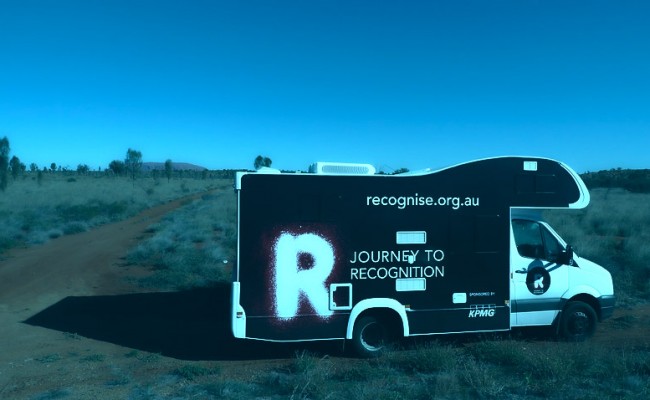Four years ago, the federal government embarked on an expensive branding and education campaign to convince Aboriginal people and broader Australian society that we should be given formal ‘recognition’ in the constitution. No wording was formalised and the process remained vague at best, and many Aboriginal communities remained sceptical of a proposal regarded as nothing more than a symbolic gesture. A Referendum Council was established, comprising of both Indigenous and non-Indigenous members, which travelled the country handing out T-shirts, and banners, and hosting community forums in an effort to promote the initiative.
The campaign culminated in a national gathering of Aboriginal people at Uluru in May. The gathering produced the ‘Uluru Statement from the Heart’, which proposed a form of constitutional recognition that includes an advisory ‘voice’ to the parliament. Some of those who attended the Uluru summit, particularly delegates from Victoria and New South Wales, were critical of the process and the wording of the statement, arguing that it did not provide a legitimate and authoritative role for Aboriginal representation in parliament, and largely ignored the demand for a discussion of treaties.
Soon after Uluru, the recognition campaign came to a quiet and unheralded end, absent of the fanfare that accompanied its launch. The Commonwealth subsequently rejected the advice provided to it by the reference group it had established. Senior government ministers dismissed the idea of limited representation to the parliament as a ‘radical proposal’ that could not be supported. And while the government’s decision was received with ‘shock’ by members of the Referendum Council, it did not surprise others versed in the orchestrated limits of what amounted to a symbolic colonial gesture.
While ‘giving voice’ to Aboriginal people in parliament might not seem such a radical proposal to some – even Alan Jones supports it – opposition from the same government that initiated the expensive constitutional recognition campaign highlights an enduring inability of white Australia to engage with Aboriginal people beyond an exercise in symbolism that is of no threat to colonial power.
Noel Pearson was a key member of the Referendum Council. Following the government’s decision to reject the Council’s recommendation, Pearson repeated the words of Patrick Dodson – that the decision was a ‘kick in the guts for Aboriginal Australians’. But while Pearson claimed that the Uluru statement itself was a rejection of ‘mere symbolism’, his own analysis of the ‘voice to the parliament’ proposal is essentially little more than an endorsement for the colonial status quo. The Referendum Council, having adopted a ‘soft recognition’ approach, was outmanoeuvred by conservative forces in government, regardless of Pearson’s concerted attempt to highlight the limitations of recognition:
The proposal is for an indigenous advisory body, constitutionally mandated but legislatively implemented, to give indigenous people a non-binding say in our affairs. Not a veto. Just a voice … [The proposal] would empower parliament to define the body, fully respecting parliamentary supremacy.
With the collapse of the recognition campaign, government – both state and federal – must now contend with overtly self-determining political and legal strategies being adopted by Aboriginal groups, most particularly a proactive treaty campaign. One such campaign, launched in 2016 and initially led by Victorian Aboriginal communities, ran counter to the national recognition roadshow and eventually forced the Victorian state government into treaty negotiations. This shifted the national focus towards a demand for genuine and sovereign treaty discussions – a shift that surprised both the federal government and the Referendum Council.
During the life of the recognition campaign, direct activism organised within Aboriginal communities gathered widespread support, particularly among younger people. Bypassing symbolic gestures, younger Aboriginal people began voicing and acting on their concerns on vital issues such as climate justice, the impact of climate change on the ability to protect country, and the struggle for a genuine recognition of sovereignty in the form of land rights. A prime example is the SEED Indigenous Youth Climate Network, which has spearheaded the campaign around protection of country. Warriors of Aboriginal Resistance (WAR), inspired by the history of Aboriginal direct activism here in Australia and by the tactics of the more recent Occupy and Idle No More campaigns in North America, rejected the concept of constitutional recognition from the outset, with their activities contingent on the statement that ‘sovereignty has never been ceded’.
Both SEED and WAR, and the direct action and education philosophies they espouse, are central to the future of Aboriginal activism and survival. Regardless of whether these organisations continue, they have raised the political conscience of young Aboriginal people who have decided that Australian governments are unable to move beyond the mentality of the colonial master. We cannot allow this mindset to continue when country is under the direct threat of development, land theft and environmental degradation. We need to recognise that the colonial project – born of violence, and an utter failure – will not be overthrown by acts of symbolism. As Aboriginal people, we must refuse the invitation to sit at the big table where, ultimately, we are made fools of.
Read the rest of Overland 229
If you enjoyed this column, buy the issue




